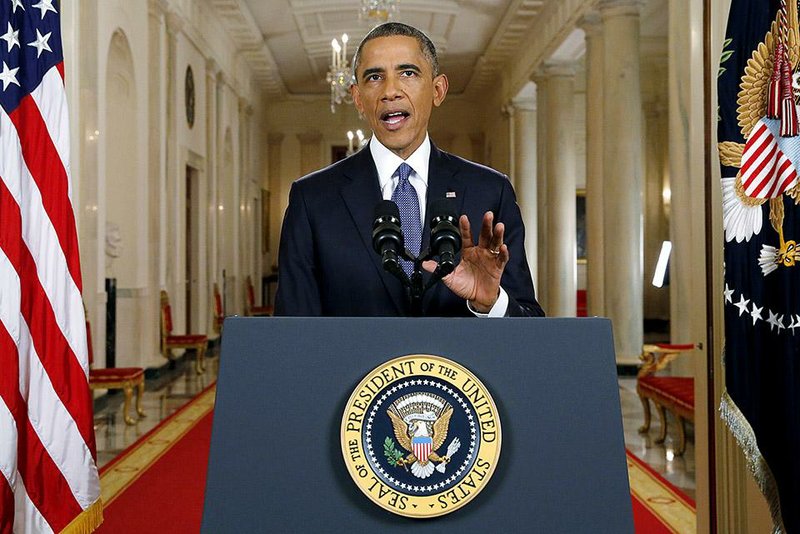WASHINGTON -- President Barack Obama said Thursday night that he will defer deportations and open the chance of better jobs for about 5 million illegal aliens, ending months of buildup and initiating a showdown with congressional Republicans.
RELATED ARTICLE
http://www.arkansas…">Delegation pans move on illegals
Even before the president's prime-time address to the nation, Republicans vowed a swift and forceful response to the executive action, accusing the president of exceeding the power of his office and promising a legislative fight when they take full control of Congress next year.
Sen. Mitch McConnell of Kentucky, who will become majority leader in January, said in a speech on the Senate floor Thursday morning that Obama would regret choosing to ignore the wishes of the American people.
"We're considering a variety of options," he said. "But make no mistake. Make no mistake. When the newly elected representatives of the people take their seats, they will act."
Obama, in his speech Thursday night from the White House, defended himself against Republican criticism that his use of executive authority to halt deportations for some aliens on the basis of their family ties to the U.S. amounts to an unfair amnesty for people who broke the law to come to the country.
"The real amnesty," he said, would be "leaving this broken system the way it is."
"To those members of Congress who question my authority to make our immigration system work better, or question the wisdom of me acting where Congress has failed, I have one answer: Pass a bill."
While Obama's actions amount the most sweeping changes to the nation's immigration system in a generation, they don't go as far as the legislation that passed the Senate last year. Obama has endorsed that legislation, which stalled in the Republican-led House.
Obama's plan will be executed through directives outlined in two presidential memorandums to Cabinet agencies that deal with immigration.
The Department of Homeland Security will streamline the visa process for foreign workers and their employers and give high-skilled workers a more "portable" work authorization, according to a White House fact sheet. The department also will expand options for foreign entrepreneurs who meet criteria for creating jobs, and for graduates of U.S. universities in science and technology fields.
The administration won't expand the number of H1-B visas for higher-skilled workers important to the technology industry.
The biggest category of people affected, about 4.1 million, are those who've been in the country more than five years and have children who are U.S. citizens or legal permanent residents. After passing a background check and paying fees, they would get relief from deportation for three years and be able to obtain work permits.
Applications for the new deportation deferrals will begin in the spring.
Obama also is expanding a program that allows people who entered the U.S. illegally as minors. This will be accomplished by moving the cutoff date by which they must have arrived to Jan. 1, 2010, from June 15, 2007. The administration didn't place an upper age limit on qualifying, provided the applicants entered the U.S. as children.
The White House estimates that about 270,000 people will qualify for that provision.
Obama said the deferred deportations don't apply to anyone who entered the country illegally after that date or those who may do so in the future. The actions will be in place only until Obama leaves office, unless his successor takes steps to expand them.
"It does not grant citizenship, or the right to stay here permanently, or offer the same benefits that citizens receive -- only Congress can do that," he said. "All we're saying is we're not going to deport you."
The administration is justifying the policy changes on both humanitarian and economic grounds.
"The actions I'm taking are not only lawful; they're the kinds of actions taken by every single Republican president and every Democratic president for the past half-century," Obama said Thursday night.
Former President Bill Clinton agreed, saying Wednesday after Obama's speech was announced that many previous U.S. presidents have issued some type of executive order on immigration and suggesting that his Democratic successor was on "pretty firm legal footing."
A senior administration official said Thursday that the decision to protect the parents of citizens and legal residents is in line with existing law that allows adult citizens to sponsor their parents for immigration. The official spoke on condition of anonymity because he wasn't authorized to be identified by name.
But Obama's plan goes a step further because the sponsoring citizen or resident doesn't have to be an adult.
Republicans in Congress called Obama's move an unconstitutional power grab.
"The president seems intent on provoking a constitutional crisis by adopting policies that he previously said were illegal," Sen. John Cornyn, R-Texas, said.
The president decided he didn't have the legal authority to include in Thursday's actions the parents of people who came to the U.S. illegally as children. However, as many as half of those parents might still qualify under other provisions of the policy, according to an administration official who asked for anonymity to describe details before Obama's address.
Anticipating opposition, Obama coupled the deferred deportations with a promise to deport illegal aliens who have been convicted of serious crimes in the U.S. and to keep more resources devoted to border security.
The Homeland Security Department will focus on apprehensions on the southern border with Mexico and on gang members, potential terrorists and criminals for deportation.
"What I'm describing is accountability, a common-sense, middle-ground approach," Obama said. "If you meet the criteria, you can come out of the shadows and get right with the law. If you're a criminal, you'll be deported. If you plan to enter the U.S. illegally, your chances of getting caught and sent back just went up."
Attorneys and immigration groups in Texas, which has a large Hispanic population, said they are setting up telethons and hotlines to serve people who may qualify under the new plan to protect them from deportation.
The Catholic Charities of Dallas said it will host information sessions to let people who might be covered under the policy know whether they can apply for it and what documents to gather.
Jenna Carl, the group's deputy director of immigration and legal services, said she didn't know yet how many people would qualify. But she said she told her staff to prepare, because the number of people seeking their services could likely be "huge."
GOP's options
McConnell did not say what options Republicans were considering in response to the president's actions, but the GOP is sharply divided about whether to shut down the government or seek Obama's impeachment to stop the executive actions from moving forward.
Several Republican lawmakers, including McConnell and House Speaker John Boehner, said they did not want to fail to pass a budget in the coming days.
"It doesn't make a lot of sense to play with shutting down the government over a particular issue if you disagree with the president," Rep. Tom Cole, R-Okla., said.
Such a strategy wouldn't get the intended result anyway, an administration official said on condition of anonymity because he was not authorized to release details before Obama's speech.
Because the immigration programs are funded through fees rather than congressional appropriations, they would keep running if the government shut down because of budget negotiations, as it did in October 2013 during a fight over funding for Obama's health care law, the official said.
But Sen. Jeff Sessions, an Alabama Republican in line to become Budget Committee chairman, said in an emailed statement Thursday that "there is no question that Congress has the power to block this expenditure and no doubt that it can be done."
The debate over the president's decision also will be a test of whether the GOP can keep its members on-message and avoid making contentious remarks that will drive Hispanic voters away from the party. As they battle the president on legal and legislative grounds, party elders would like to see Republicans shore up support with Hispanics and their families.
"We've had numerous discussions about that," said Sen. John McCain, R-Ariz. "It only takes a couple" of comments for an unflattering narrative to build about the Republican response. "That's the trouble with having some of these new young punks around here. They ought to listen to us old geezers."
Outside Washington, Republican governors were drawing up their own plans to scuttle the president's action. On Thursday, Gov. Mike Pence of Indiana said he was leaning toward filing a lawsuit to block the White House action from being carried out, making him the third Republican governor to threaten such a move.
Govs. Rick Perry of Texas and Scott Walker of Wisconsin have said that they, too, are weighing lawsuits to preclude Obama from offering new legal protections to illegal aliens.
Defenders of Obama's executive action were just as urgent. Speaking on the floor of the Senate on Wednesday after the president's speech was announced, Sen. Barbara Boxer, D-Calif., said Obama's actions would help the economy by keeping families together.
"If we don't act, the dire situation of undocumented immigrants will only get worse, families will continue to be torn apart, people will continue to live in the shadows," Boxer said. "I say to the president today, as I have said to him in writing, if you act, you will have my strong support, and you will have the support of so many people across the country."
Rep. Ben Ray Lujan, D-N.M., said he supported Obama's actions even as he continued to hope that Republicans would eventually join Democrats in passing a bipartisan overhaul of the nation's immigration laws.
"Until that time, the president's legal action will ensure that millions of men and women who work hard and pay taxes can now stay with their families," Lujan said.
Richard Trumka, president of the AFL-CIO, the nation's largest labor group, applauded Obama's action while warning that business will use the expansion of temporary visas to undermine wages at tech companies. The AFL-CIO will pressure the government to create rules so that "new workers will be hired based on real labor market need and afforded full rights and protections," he said.
Obama plans to travel to Las Vegas today, where he is expected to promote the immigration actions at a high school alongside Sen. Harry Reid of Nevada, the majority leader.
"This is personal to me," Reid said in a statement, adding that he has been disappointed that Republicans have "ducked, dodged and skirted" taking up immigration legislation, forcing Obama to act administratively. "There is no better place than Nevada for President Obama to outline the actions he is taking."
Information for this article was contributed by Angela Greiling Keane, Heidi Przybyla and Mike Dorning of Bloomberg News; by Michael D. Shear of The New York Times; by Robert Costa of The Washington Post and by Ken Thomas, Julie Pace, Alicia A. Caldwell, Steve Peoples, Juan Carlos Llorca and staff members of The Associated Press.
A Section on 11/21/2014

